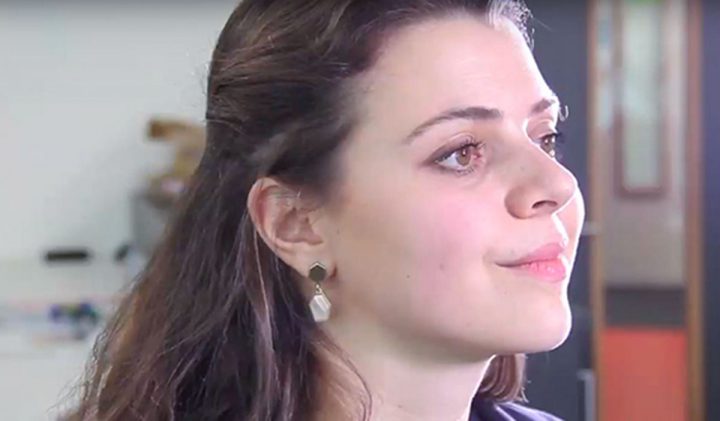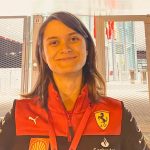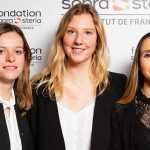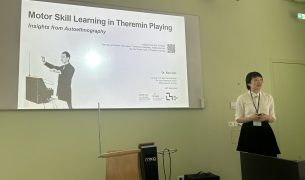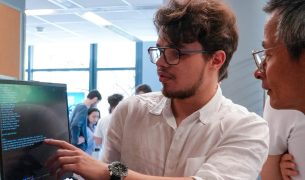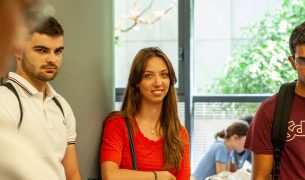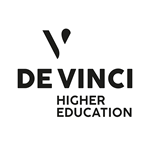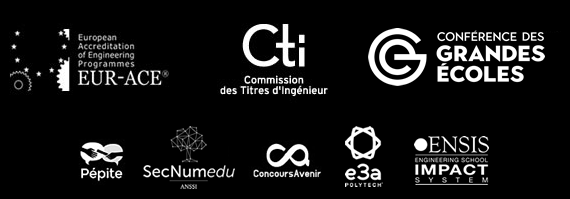Once she graduated from ESILV with a Master in Engineering degree, Hélène, class of 2012, started to explore the world of Tech. Today, she manages a sales team in the field of operational intelligence for security. Her story.
Hello everybody, I am Hélène Liakis, and I graduated from ESILV in 2012.
An engineering school part of a transversal campus
My sister had attended EMLV a few years before me. What made me choose? It was a person who made me come to the school, I hesitated, but she said “come, come to the school”, and indeed I went, I had a tour of the school’s facilities and found them to be huge, in any case, they made me want to join the school.
Indeed, there was also the school’s location, it’s located at La Defense, so it’s the heart of French companies today, and what made me decide to join ESILV was perhaps that, unlike other engineering schools, it is embedded in a campus with other schools.
At that time, I was already very interested in transversality, and it’s true that being integrated into an engineering school, but also being able to exchange or have associations in common with a management school and a multimedia school, I found that it made sense for my choice of school.
A love of mathematics, the driving force behind getting into an engineering school
For as far back as I can remember, I have always loved math, I used to spend a lot of time with my mother or father solving problems, and this is something that I have kept today, so first of all, I would say this passion for finding solutions to impossible problems, and secondly, the love for numbers, I have always loved calculations.
My mother used to make me repeat my multiplication tables when I was young, and I always loved numbers, and especially statistics, and that’s what guided my choice of an engineering school in any case.
Developing an engineering culture through project-based learning
I do remember the ESILV teaching format because I already loved the idea of being project-oriented.
In that respect, we did theory, but we did many projects above all. That makes sense today because when you’re involved in a company, we all do essentially work on projects.
I liked this approach of teaching by practice more than by theory, and today it helps me, on the one hand, because we did this in the engineering school, but also we did it in transverse, with EMLV and IIM, and today it helps me because since I work, I never ceased to work on projects with people with different profiles, and this is fundamental to ESILV.
What also helped me at ESILV was learning about the overall engineering culture and the idea of having a problem and being together around the table to look for a solution. Again, this is not necessarily obvious because there is no specific course, ” what is the engineering culture “, but I would say that this is what the school brought to me in the aftermath, now that I have been out of school for nine years. I definitely learned a lot about the engineering culture.
Work placements are a way to get to grips with company issues
So at the time, there was no work-study program at ESILV; on the other hand, I did an internship in the 2nd or 3rd year, where it was very much a question of getting to know the companies. Then we had an internship in the 4th year Then we had an internship in the 4th year and one in the 5th year. What was very good was that, at the time, we had access to all the contacts of the people who had been tutors for former trainees. So, to find an internship, I took the list of former tutors. I had come across someone looking for a new intern, which was very useful. In fact, beyond the theory and the practice within the engineering school, what was remarkable was to be confronted with the real problems of a company.
So it’s true that I benefited enormously from having these three internships within the five years of the engineering course.
Getting bilingual in engineering school thanks to international studies
For my international semester, I went to Sydney, Australia, to the UTS, the University of Technology in Sydney, and I went there because I wanted to be immersed in an English-speaking country. So I went with three students from my class, and then there were also three other students from a previous class, and it was great.
What I loved was being exposed to another culture to discover what the Australian culture was. So to make sure that I was confronted with English, I even worked my extra hours all week as a waitress in a big hotel there to make sure that I would come back bilingual, and it happened, I got my TOEIC, and everything went well. I even have one student who went with me, who even stayed for her internship and then stayed on to work there.
Therefore, the school offers excellent opportunities to grow internationally, whether as an exchange student and continue there for an internship or a job.
Leading an engineering career like a choirmaster
I started in a French company selling IT services. It’s true that what helped me a lot, what still helps me today, is this knowledge of the engineering culture, and then I evolved towards American companies, mainly on the software sales part.
My job is essentially to be a choirmaster, the client comes with a need, and my job is to make sure that we put the right people in front of him to answer it, whether it’s a request or a quote, when it’s done more formally, to orchestrate the teams to make sure that the answers are provided on time, and that they meet the clients’ requirements.
ESILV Master in Management, five memorable years
I still get a lot of joy coming back here because it was five years of my life that I loved, I was a class president, so I was close to the students, many of whom are still friends today.
I remember Australia, of course, I remember the internships, I remember the friends I made there, I remember the association, I also participated in the student committee, so I also made friends there that I have kept today, I remember the meetings with the students, with the professors and I think, this engineering culture, wanting to find solutions to impossible problems, and also this idea of transversality, of really wanting to learn how to find solutions to problems but also by getting the point of view of personalities who do not necessarily come from the same background as us. I still use it a lot today.
Rallying women around engineering studies and tech
When I was at ESILV, we had 11% women in the first two years, and then in my financial engineering major, 17%.
So I indeed wish to say that if women are looking at these messages, to tell you that we need you in engineering school. We also need you in Tech companies, so don’t hesitate to join these engineering programmes, you will learn a lot, and the market is significant in Tech, you will find your place there, for sure.









